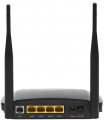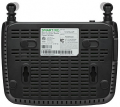SmartRG SR506n
Jump to navigation
Jump to search
SmartRG SR506n
Sold from Aug 2018 to July 2021
- Home
- Configuration from File
- Routed Configuration
- Bridge Configuration
- Firmware Check and Update
- Changing WiFi Channels on SmartRG modems
- Changing WiFi Name or Password on SmartRG modems
- Changing DNS Settings on SmartRG Modems
- Port Forwarding
- About your SmartRG SR506n
- SmartRG - Manual
- SmartRG - Data Sheet
- Highspeed Tips - SR505n Emulator (differs slightly)
Preparation
Updated: 2018-08-29 Recommended Firmware Version: 2.6.1.6
The SmartRG SR506n modem router supports both ADSL mode and VDSL mode. Provided it is configured correctly, it can be switched between ADSL and VDSL plans without the owner having to buy a new modem or even reconfigure your existing one.
- Note: Fees for changing plans may still apply. Consult: DSL Rates
Before you start configuring the SmartRG SR506n, there are 4 things to check:
- Firmware Check: Check if you're using older firmware and upgrade to the recommended firmware version. If you're unable to access the internet to request newer firmware, note that the screenshots shown and steps outlined may not align with what you see. Contact the support@ncf.ca for assistance if you run into problems.
- Factory Settings and Standard Configuration: These instructions assume you're configuring SmartRG SR506n modem out of the box or after a factory reset. If the modem is not new, it is recommended to reset the modem to the factory defaults by holding down the reset button with a paper clip for ~10 seconds.
- Also, these settings are our recommendations for most NCF members. To learn more about making custom changes to your particular modem, consult the manual.
- Modem Installation - Configure over Ethernet: Consult the SmartRG SR506N modem instruction sheet (page 1) on how to set up the modem and connect to it over ethernet. We do not recommend configuring your modem over a WiFi connection.
Configuration
Methods
The 2 main ways of configuring the SmartRG SR506n modem:
- Using a custom configuration File: You can request a custom configuration file for your NCF DSL connection from support@ncf.ca.
- Manually following configuration steps
Options
- Routed Operation - Standard configuration for most members with SmartRG SR506n serving as both modem and WiFi router.
- Routed Operation with separate WiFi Router - Recommended configuration for members with their own WiFi router. The modem will make the PPPoE authentication and both devices will negotiate DHCP.
- Bridged Operation with separate WiFi Router - (Advanced) for members with their own routers and are knowledgeable about managing it themselves. The router with handle both authentication and DHCP.
Images
See Also
- Modem Configuration - for a complete list of instructions for all NCF modems
- About SmartRG modem lights
- File:Changing_Wireless_Channels_on_SmartRG_SR505N.pdf SmartRG SR505N Changing WiFi Channels
- Dynamic DNS
- Port forwarding with the SmartRG SR505N





